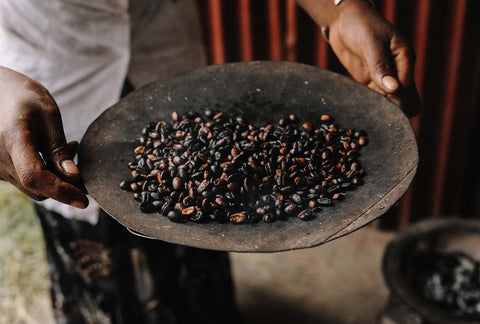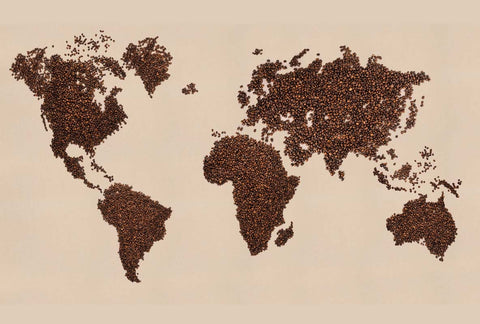
Though there are many coffee producers, one of the countries that should be celebrated for their coffee culture is Ethiopia. As one of the largest coffee producers in the world, their contribution to coffee consumption can’t be ignored.
The Birthplace of Coffee

While it may just be an old tale, it’s widely believed that Ethiopia is the birthplace of coffee. This legend goes back to around 850 A.D., when a goat herder named Kaldi noticed that his goats were behaving strangely. After investigating why they were jumping around and acting excited, he realized that the source of their energy was coming from a small shrub with red berries.
Excited about his findings, he brought the fruit to a nearby monastery, where he was greeted with skepticism. One monk claimed that the effect of the coffee beans was the work of the devil, and subsequently threw the beans into the fire. After the monk smelled the aroma of the roasted beans, he decided to give them a second chance. They removed the beans from the fire, boiled them, and took their first sip of what is now known as coffee. The effects were so noticeable that the monks decided they would be the perfect tool to help them stay alert during long hours of prayer.
Though this myth is conjecture, some say that coffee beans may have been chewed for centuries as a stimulant. While there’s no way to prove the legend, the strong coffee culture in Ethiopia gives credibility to the story.
Flavor Profile of Ethiopian Coffee

Ethiopian coffee is commonly described as having a flowery taste with hints of wine and a berry aftertaste. These flavors are due to the fact that beans are often dried while they’re still within the cherry fruit of the plant. While there is a common flavor profile, there are so many factors that determine the acidity and flavor notes of the coffee bean. With over 420,000 square miles, it’s easy to say that not every coffee grows under the same conditions, whether due to the environment or the farmer.
One of the factors that affect the flavor of coffee beans is how the beans are processed. The two popular modes of processing in Ethiopia are wet processing and sun drying. Wet processing is when the beans are placed in water for sorting; this helps farmers remove the pulp of the cherry to expose the inner bean. This is followed by a 12-hour soak and two weeks of drying on a roasted bed. The alternative option, sun drying, is sorted by hand and graded. The beans are then dried on raised beds in the sun for several weeks; the outer layer of the cherry is removed before the beans are sold. Both of these labor-intensive operations require hard work, but the difference in processes contributes to the variety of flavors that Ethiopia produces.
Ethiopian Coffee Ceremony

As one of the biggest producers of coffee in the world, it’s no wonder that coffee brings an amazing social aspect to the country. Ethiopia’s coffee ceremony is a daily tradition that has a huge cultural significance and takes hours out of the participants day. The ceremony lasts two to three hours and is often performed three times a day - once in the morning, once at noon, and once in the evening. It’s viewed as a huge honor to be invited to somebody’s ceremony, and there’s always enough coffee for friends and family to share. During this event, various topics can be discussed, with typical conversation steering towards politics, community, religion, and neighborhood gossip.
Aside from its social aspect, the preparation of the coffee plays an important role in the ceremony. Although traditions may vary depending on the region, the preparation of the coffee generally has the same process. Oftentimes, the ceremony begins with the burning of incense to ward off evil spirits and will continue to be burned throughout the ceremony. The host will then wash the beans, which are often washed by hand and then cleaned in a clay pan. This is done by holding the pan over hot coals or a small fire, where the beans are stirred until the husk (outer layer) and debris are removed.

In the same pan, the beans are roasted until they reach the desired stage, which can be identified by the color of the beans (medium brown or darker if desired). The beans are then grinded with a mortar and pestle and added to the jebena, the typical Ethiopian coffee pot made of pottery. Once boiled, the coffee is ready to be enjoyed by the guests. It’s expected that the hostess is praised for her ability to make a great cup of coffee, and guests usually indulge in multiple cups throughout the event.
With so many hours dedicated to this process each and every day, it’s obvious how important this tradition really is. It’s more than just a cup of coffee; it’s an essential part of the social and cultural life in Ethiopia.
Meet Wondimu Unu

Ethiopia is filled with hardworking farmers who each have their own technique and coffee growing process. Wondimu Unu is among the many coffee producers who are devoted to keeping the tradition in Ethiopia alive. His coffee is produced on his 15-acre farm located in the Gedeb district of the Gedeo Zone, Southern Nations, Nationalities, and Peoples' Region, Ethiopia.
Wondimu has been independently cultivating coffee for 15 years, but this is the first year that he has been able to sell his coffee as a micro-lot. His passion and knowledge about specialty coffee can be experienced every time you take a sip of his coffee. The chart below identifies information specific to his roast.

With so many coffee producers in Ethiopia, we enjoy putting a face behind their product. Wondimu is just one of the many farmers who works hard to support his family and bring growth to his community. At Pax & Beneficia, we appreciate partnerships that make a difference, both to us and to the people who make it possible. That’s why we’re proud to say that we’ve partnered with Wondimu so that others can experience the flavors of Ethiopia and help keep the tradition alive.



